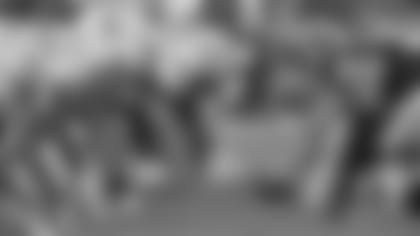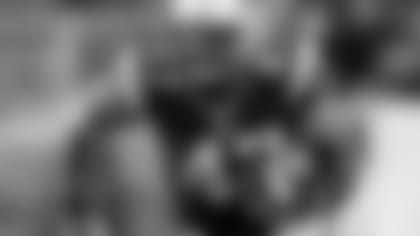Q: While winning is obviously the main objective, does the fact that you won your last game without scoring a touchdown raise concerns about your offense?
JH: Well, I mean there are always concerns. I don't care what happens, you look at the game and there are things to improve on. You're either getting better or you're getting worse, so we've got plenty of things to get better at.
Q: It seems like your team is getting better at the right time again this year. What are the biggest improvements you've seen from the beginning of the season?
JH: I think the biggest thing is that we've finished games out. We had lost a number of close games early in the year that were – I think we've had, I think it's [10] games that have been decided by three points or less, and early on we lost all but one of them. We've won those lately, and that's been the biggest difference. All things go into that: we've blocked better, we've tackled better, we've covered better. There are a lot of things that go into that, it's just kind of football across the board.
Q: Earlier in the year, you were tied with Cincinnati late in the game and went on to beat them in overtime. When talking about mental toughness, do you look back at that game and say, 'We learned a lot from that'?
JH: Well, I don't know if we learned a lot from it, but we probably discovered that something was there. I believe we've been a team of resolve for quite a long time now, and how to apply that sometimes is something that you do develop and probably learn as a new group of players and all that, so that was a great moment. Our guys didn't allow it to dictate the outcome, the circumstance didn't dictate the outcome, and they were able to finish by making a few plays. That's usually what it comes down to – if you can make a few plays at the end that you have to make, regardless of the plays that they make, then you have a chance to come out on top.
Q: You've had a lot of turnover on defense in the past year, yet the personality of your team as a physical football team seems very similar. What is the key to maintaining that consistency?
JH: It starts with the players that you have. We've turned over some personnel, but we've kept a lot of players too. I think if you look at our defense especially, you'll see a lot of similar faces that have been there for a number of years, so those guys, they become what it revolves around. And then what the other guys left in terms of expectations with the younger guys, that kind of carries forward, that's what a legacy is all about. So if we have a tradition of that then the young guys pick up on that and it becomes who they are as well.
Q: How important is it to develop your backups when you lose starters so that they're ready when their opportunity comes?
JH: Yes, it might be probably the most important thing in the National Football League. I think you don't have to look any farther than your own team right there to see the value of that. I mean, nobody's done a better job than the Patriots in terms of replacing players, playing younger guys, putting guys into spots and having them maintain a high standard and win games, and they have. That's the same thing we're trying to do here, try to develop those guys from the first moment they step on campus to try to work on making them the best that they can be.
Q: League-wide, does it seem like a high number of backups are ascending to the starting level for one reason or another and playing critical roles at the most critical time of the season?
JH: You know, I really don't know the answer to that. I don't. It always seems high. It seems like it's always kind of surprising every year, but then these guys, many of them become the stars of tomorrow, so maybe that's just the way it always is. I don't know, it'd be interesting to see a study on that though, it really would.
Q: From looking at the Patriots on film, what do they look like now without Rob Gronkowski in the lineup versus when he was in the lineup?
JH: I mean, he's a great player. I think that they've done a great job of replacing [him] and winning. He wasn't in the lineup earlier in the year, and look at all the games they've won. I think they do a really tremendous job as a coaching staff of looking at players' strengths, determining how they can fit into their system, and developing guys that they see a role for down the road, that they see a strength that they can utilize and having that player ready to go in there and play that role. So they [are] probably better than any team in the league as far as sliding in directions they need to go to put their guys in a position to make plays. They're definitely different. Obviously they're not quite as tight end oriented as they would be with him in there, but they go to the other guys. They go to the wide receivers, they go to the backs, they go to the tight ends that will be playing, and they've got a quarterback that's really able to pull that off in a spectacular way oftentimes.
Q: The Patriots have had Kenbrell Thompkins and Aaron Dobson out for the last couple of weeks. Is it tough to get ready for this team when you're not sure whether they're coming back and there is uncertainty about who you're preparing for?
JH: I was really hoping you guys would provide me with some information along those lines.
Q: Call the NSA.
JH: I don't think they could even crack Bill Belichick's phone line.
Q: How tough is it to get ready when you don't know which players will get in there?
JH: It's tough. That's why coaches don't want to give that information out. It forces you to prepare for more possibilities. If you can hone in on who's going to play – but it's a double-edged sword too, because if guys don't play, then that's one less guy in the game, but the team that has the injury, at least they know, they can expect who to play and they can prepare accordingly. The team that doesn't, the opponent doesn't know who's going to play, and it makes it a challenge.
Q: Ravens Defensive Coordinator Dean Pees mentioned that it is important to be extremely prepared on defense every second after the ball has been spotted when playing the Patriots. Is that continuing this year? How important is Dean's knowledge of the Patriots having worked with them in the past?
JH: Right. Well, the first question, definitely it's important still. They've been in the huddle a little more than they have been in the past, but that doesn't mean that that won't change. One thing about the Patriots is you just never know what you're going to get, whether it's tempo, formation, personnel, they can come out and – I know one year in [Philadelphia] they came out and threw the ball 53 times on us. I happened to be the secondary coach, you don't forget that. They never put a running back on the field. So you just never know what to expect, and I think that's one of their great strengths. As far as Dean, certainly it helps, it always does. I think we have a really tremendous staff across the board. Just a knowledgeable staff and an experienced staff goes a long way, then Dean having some insight into their organization, or their strategy, I guess, their football, is a big plus. But I don't think it's anything that's a determining factor, because we've played against them so much they're like a division opponent. They know us, we know them. I think they understand how we'd like to play the game, and I hope that we can continue to learn how they like to play the game and try to be prepared as you can be.
Q: How has your working relationship with Steve Spagnuolo been, and what does he bring to the team?
JH: I appreciate that question. Yeah, Steve's obviously – we go way back, and he's been a big help both to Dean and our defensive coaches but also to me as well with his head coaching experience. I've had a chance to bounce a lot of things off of him. We have a kind of relationship where he can walk in and say, 'Hey, I noticed this,' 'I think you should be aware of that,' or 'Have you ever thought about this other thing?' And that's just been tremendously valuable to me and to all of us. Steve's a great coach. Great coach, and an even better person.
Q: How would you characterize this rivalry? Do you even characterize it as a rivalry?
JH: Yeah, I hope so. When you have – you'd like to think the thing that defines rivalries are great games played by great teams over an extended period of time, and there's a lot of stake. I feel like that's been the case in our rivalry with the Patriots. We feel honored to be on that, considered a rival with them, and I'm not sure how they feel about it, but we sure feel that way.
Q: Your team has gone through a lot of changes recently. Does it seem like February in New Orleans is a lifetime away?
JH: Yes. I was listening to my iPod today, and a great song came on: Tom Petty, "Running Down a Dream." And if you go back and listen to the words on that song, it kind of hits on all of those things: you're in the dark, and you kind of can't see where you're going sometimes. It's a mystery, but you have hope that you're going to come out the other end. To me, where I'm at today, at this one moment in time, Tom Petty summarizes it best. So you have my quote if you can find the words to that song somewhere.
Q: Some teams who make the Super Bowl sometimes struggle the following season. Did you seek out any advice to get some perspective on that?
JH: You do, and you also realize that every situation is different, but I actually talk to Coach Belichick periodically. He's a guy that I have tremendous respect for, and have for many years. Saw him at the owners meetings, talked to him on the phone a few times, he gets down here with the lacrosse stuff in Baltimore, so we get a chance to visit, and he probably knows I'm asking him indirect questions directly, or direct questions indirectly, maybe that's the way to say it. But going against him, I know it's always giving context to that, the fact that we have to play each other. But he would definitely be a guy, I talked to Coach [Andy] Reid, and talk to my dad all the time, my dad's probably, for both of us [brother, Jim Harbaugh], our number one go-to-guy as far as that kind of stuff.
Q: What was the best piece of advice you think you got?
JH: I don't know. My dad's best piece of advice, he says 'Get the lead, keep the lead.' We put 'extend the lead' in there, whether it be during the season or in a game or whatever, because we have not separated from teams and extended leads, and therefore they've come back and made every one of these games close whenever we have had the lead, so we had to tweak it a little bit. But you look at it philosophically or you look at it, what it really means, or you look at it as far as win percentages in a game, it turns out to be pretty profound, as simple as it sounds. But every circumstance is different, every day is different, every personnel – whether you get an injury or a guy you lose through contracts and all those things, that makes every situation difficult. The biggest thing is you lose players because your players are sought-after. The Patriots have had to deal with that, we've had to deal with that, and the ability to keep winning through all that to any degree is tough enough, let alone getting back to the big show, which is incredibly difficult. So I think what they did a few years back when they won three out of four years was one of those historic accomplishments that needs to be seen in the light. It's just a tremendous accomplishment.
Q: Logan Mankins had to kick out and play tackle against Miami. Does he play as well at tackle as he does at guard, and if so, how much is that a testament to him that he can play both positions so well?
JH: Oh yeah, it's amazing. You don't see drop-off. I don't think there's anything Logan Mankins can't do. From the first day he got there until now, he's even a better player than he ever was. He's tough, he's physical, he's just a man in there. I think he can do anything; I don't see any downside to him playing either one of those positions for them.
Q: Is the fact that the Patriots play so well from behind quarterback-based? Do you look at Tom Brady as being extremely important in that factor, that he's going to be relentless at the end of a game?
JH: Yes. To me, that's always the quarterback [that] drives that, and he has almost an unparalleled control of that offense. I mean, whether guys are jumping offside or getting the play or understanding their assignment on the field at that particular time, really goes directly to the quarterback, and then they're not a simple offense. He's able to get everybody on the same page in the most critical situation when there's so much on the line, probably because he's been in those situations so much and he has such an incredible understanding of the game. I do, I think it goes back to him.
Q: How has Joe Flacco taken over as the leader of your team? The perception in the past was that Ray Lewis and Ed Reed have filled that role. Has Flacco been that for you guys?
JH: Well, I don't think he's become them, but he's grown into that leadership role steadily over the course of the last six years. I think he's on track, just like Tom Brady would have been on track six years into his tenure there probably. I hope he's on the same kind of a trajectory, but he's definitely a leader of our team. We have a number of guys that are tremendous leaders, but he's our quarterback, he's our leader, and I think he's a great player and a great leader and a great person.
Q: Has Joe really embraced the concept of doing a lot of little things to get a win, even if he may not have the best game statistically?
JH: Yes. To me, that's what Joe's about, and I think the great ones really understand that. That's what Tom Brady understands, so yes, that's his thing. He'd love to put up big numbers like anybody, but playing winning football is the most important thing.
Q: How long does that take for a quarterback to mature into something like that?
JH: I don't know. That'd be a good question for guys who have been around a bunch of quarterbacks. Joe always was like that. That's kind of how he came in, and that's probably the way he was raised growing up by his parents. It's just kind of who he is.







































